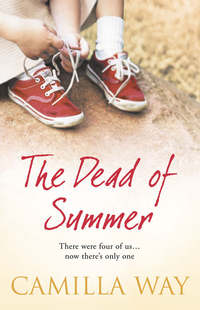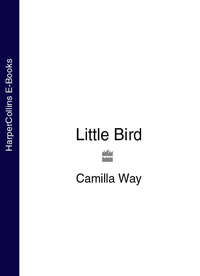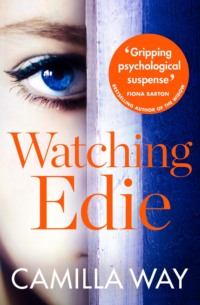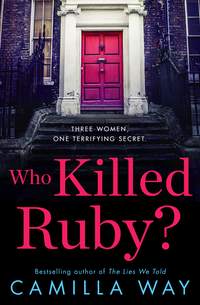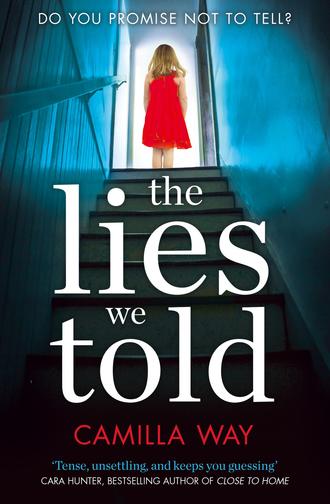
Полная версия
The Lies We Told: The exciting new psychological thriller from the bestselling author of Watching Edie
I used to see them when they came back to our village for holidays, those old classmates of mine. And I’d see how they looked at me, with my clothes from the market and my lack of ambition, see the flash of superiority or bewilderment in their eyes when they realized I didn’t want to be just like them. But I didn’t care. I knew that what I wanted would bring me all the happiness I’d need.
Year by year, woman by woman, things began to change. They began to change. As we all neared our thirties, baby after baby began to make their appearance on those weekend visits. Of course, I’d been trying for a good few years by then, had already had many, many months of disappointment to swallow, but nothing hit me quite as hard as seeing that endless parade of children of the girls I used to go to school with.
Because I could see it, in their faces, how it changed them. How overnight the nice clothes and interesting careers and successful husbands which had once defined them became suddenly second place to what they now had. It wasn’t the change in them physically; the milk-stained clothes or the tired faces, it wasn’t the harassed air of responsibility or the being a member of a new club or even the obvious devotion they felt. It was something I saw in their eyes – a new awareness, I suppose – that most hurt me. It seemed to me as though they’d crossed into another dimension where life was fulfilling and meaningful on a level I could never understand. And the jealousy and despair I felt was devastating. Plenty of women, I knew, were happily childfree, leading perfectly satisfying lives without kids in them, but I wasn’t one of them. For as long as I could remember, having a family of my own was all I’d dreamt of.
So, when finally, finally, our miracle happened, it was the most amazing, most joyful thing imaginable. That moment when I held Hannah in my arms for the first time was one of pure elation. We loved her so much, Doug and I, right from the beginning. We had sacrificed so much, and waited such a long time for her, such a horribly long time.
I don’t remember exactly when the first niggling doubts began to stir. I couldn’t admit it to myself at first. I put it down to my tiredness; the shock and stress of new motherhood, or a hundred other different things rather than admit the truth. I didn’t let on to anyone how worried I was. How frightened. I told myself she was healthy and she was beautiful and she was ours, and that’s all that mattered.
And yet, I knew. Somehow I knew even then that there was something not quite right about my daughter. An instinct, of the purest truest kind, in the way animals sense trouble in their midst. Secretly I would compare her to other babies – at the clinic, or at Mother and Baby clubs, or at the supermarket. I would watch their expressions, their reactions, the ever-changing emotions in their little faces and then I’d look into Hannah’s beautiful big brown eyes and I’d see nothing there. Intelligence, yes – I never feared for her intellect – but rarely emotion. I never felt anything from her. Though I lavished love upon her it was as though it couldn’t reach her, slipping and sliding across the surface of her like water over oilskin.
At first, when I voiced my concerns to Doug, he’d cheerfully brush them aside. ‘She’s just chilled out, that’s all,’ he’d say, ‘let her be, love,’ and I’d allow myself to be reassured, telling myself he was right, that Hannah was fine and my fears were all in my head. But when she was almost three years old, something happened that even Doug couldn’t ignore.
I was preparing breakfast in the kitchen while she sat on the floor, playing with a makeshift drum kit of pots and pans and spoons I’d got out to entertain her with. She was hitting one pan repeatedly over and over, the sound ricocheting inside my skull, but just as I was mentally kicking myself for giving them to her the noise suddenly stopped. ‘Hannah want biscuit,’ she announced.
‘No, darling, not yet,’ I said, smiling at her. ‘I’m making porridge. Lovely porridge! Be ready in a tick!’
She got up, said louder, ‘Hannah want biscuit now!’
‘No, sweetheart,’ I said more firmly. ‘Breakfast first, just wait.’
I crouched down to rummage in a low drawer for a bowl, and didn’t hear her come up behind me. When I turned, I felt a sudden searing pain in my eye and reeled backwards in shock. It took a few moments to realize what had happened, to understand that she’d smashed the end of her metal spoon into my eye with a strength I never dreamed she had. And through my reeling horror I saw, just for a second, her reaction; the flash of satisfaction on her face before she turned away.
I had to take her with me to the hospital, Doug not being due back for several hours yet. I have no idea whether the nurse in A&E believed my story, or whether she saw through my flimsy excuses and assumed me perhaps to be a battered wife, one more victim of a drunken domestic row. If she did guess at my shame and fear, she never commented. And all the while Hannah watched her dress my wounds, listened to the lies I told about walking into a door with a silent lack of interest.
Later that evening when she was in bed, Doug and I stared at each other across the kitchen table. ‘She’s not even three yet,’ he said, his face ashen. ‘She’s only a little girl, she didn’t know what she was doing …’
‘She knew,’ I told him. ‘She knew exactly what she was doing. And afterwards she barely raised an eyebrow, just went back to hitting those damn pots like nothing had happened.’
And after that, Hannah only got worse. All children hurt other kids, it happens all the time. In every playgroup across the country you’ll find them hitting or biting or thumping each other. But they do it out of temper, or because the other child hurt them, or to get the toy they want. They don’t do it the way Hannah did – for the sheer, premeditated pleasure of it. I used to watch her like a hawk and I’d see her do it, see the expression in her eyes as she looked quickly around before inflicting a pinch or a slap. The reaction of pain was what motivated her. I knew it. I saw it.
We took her to the doctor’s, insisting on a referral to a child psychologist – the three of us trooping over to Peterborough to meet a man with an earnest smile and a gentle voice, in a red jumper, named Neil. But though he did his best with Hannah, inviting her to draw him pictures of her feelings, use dolls to act out stories, she refused, point-blank. ‘NO!’ she said, pushing crayons and toys away. ‘Don’t want to.’
‘Look,’ Neil said, once the receptionist had taken Hannah out of the room. ‘She’s very young. Children act out sometimes. It’s entirely possible she didn’t realize how badly she would hurt you.’ He paused, fixing me in his sympathetic gaze. ‘You also mentioned a lack of affection from her, a lack of … emotional response. Sometimes children model what they see from their parents. And sometimes it helps if the parent remembers that they are the adult, and the child is not there to fulfil their own emotional needs.’
He said all this very kindly, very sensitively, but my fury was instantaneous. ‘I cuddle that child all day long,’ I hissed, ignoring Doug’s restraining hand on my arm. ‘I talk to her, play with her, kiss her and love her and I tell her how special she is every single minute. And I don’t expect my three-year-old to “fulfil my emotional needs”. What kind of idiot do you think I am?’ But the seed was set, the implication was clear. By hook or by crook it was my fault. And deep down of course I worried that Neil was right. That I was deficient somehow, that I had caused this, whatever ‘this’ was. We left that psychologist’s office and we didn’t go back.
That day, the day she killed Lucy, I stood looking in at my five-year-old daughter from her bedroom door and any last remaining hope I’d had – that I’d been wrong about her, that she’d grow out of it, that somewhere inside her was a normal, healthy child – vanished. I marched across the room and took her by the hand. ‘Come with me,’ I said and led her to my bedroom. Her expression, biddable, mildly interested, only made my fury stronger. I dragged her to the bed and she stood beside me, looking down at Lucy’s head on my pillow and I saw – I know I saw – the flicker of enjoyment in her eyes. By the time she’d turned them back to me they were entirely innocent once more. ‘Mummy?’ she said.
‘It was you,’ I said, my voice tight with anger. ‘I know it was you.’ I loved that bird. I had inherited her from an elderly neighbour I’d once been close to, and during those years of childlessness Lucy had become the focus of all my attention; a pretty, defenceless little creature to take care of, who needed me. Hannah knew how much I loved her. She knew.
‘No,’ she answered, and tilted her head to one side as she continued to consider me. ‘No, Mummy. It wasn’t me.’
I left her standing by the bed and ran downstairs to the kitchen. And there was Lucy’s cage, its door swung open, the tiny headless body lying on the floor beside it cold and stiff. I looked around the room, my eyes darting wildly about. How had she done it? What had she used? She had no access to the kitchen knives, of course. Suddenly a thought struck me and I ran back up the stairs to her bedroom. And there it was. The metal ruler from Doug’s toolbox, lying on her table. I’d heard her asking him for it the day before – for something she was making, she’d said. It lay there now, next to her craft things and I stared down at it as nausea rose in me.
I hadn’t heard Hannah follow me from the kitchen until she slipped into the room and stood beside me. ‘Mummy?’ she said.
My heart jumped, ‘What?’
Her eyes fell to my belly. ‘Is it all right?’
The slight lisp, that pretty, melodic voice of hers, so adorable – everybody commented on it. I bit back my revulsion. ‘What?’ I asked. ‘Is what all right?’
She considered me. ‘The baby, Mummy. The little baby in your tummy. Is it all right? Or is it dead too?’
I put a hand to my belly as defensively as if she’d struck me there. Her gaze bored into me. ‘Why would the baby be dead?’ I whispered. ‘Why would you say that?’ There’s no way she could have known of course that she’d touched upon my greatest fear – that this new baby, our second miracle, would not survive, would not be born alive. It was the stress of my relationship with Hannah that caused this paranoia, I think. I almost felt as though I would deserve it, because I’d made such a mess of everything with her. My unborn baby would be taken from me, as penance.
As I gazed into her eyes, fear stroked the back of my neck. ‘Stay right here,’ I said. ‘Stay here until I say.’
That night I described to Doug what had happened. ‘What are we going to do?’ I asked him. ‘What the hell are we going to do?’
‘We don’t know it was Hannah,’ he said weakly.
‘Who the hell was it, then?’
‘Maybe … God, I don’t know! Maybe it was a fox, or one of the neighbours’ kids mucking about?’
‘Don’t be ridiculous!’
‘We have foxes in the garden all the time,’ he said. ‘Are you sure the back door was closed?’
‘Well, no,’ I said, ‘It was open. But …’
‘We’ve had to tell Hannah before about leaving the cage door unfastened,’ he added.
This was also true, she loved to feed Lucy, and though she knew she wasn’t allowed to open the door without me there, it was possible she had fiddled with the latch. ‘OK, but what about what she said about the baby?’ I demanded.
Doug rubbed his face tiredly. ‘She’s five years old, Beth. She doesn’t understand about death yet, does she? Maybe she’s feeling anxious about having a new sibling.’
I stared at him. ‘I can’t believe you’re saying this! I know it was Hannah. It was written all over her face!’
‘And where were you?’ he said, his voice rising too. ‘Where the hell were you when all this was going on? Why weren’t you watching her?’
‘Don’t you dare make this my fault,’ I shouted. ‘Don’t you dare do that!’ On we argued, our worry and distress causing us to turn on each other, sniping and defensive.
‘Mummy? Daddy?’ Hannah appeared in the doorway, looking sleepy and adorable in her pink pyjamas. She held her teddy in her hand. ‘Why are you shouting?’
Doug got to his feet. ‘Hello, little one,’ he said, his voice suddenly jolly. ‘How’s my princess? Got a cuddle for your daddy?’
She nodded and edged closer, but then said in a small, sad voice, ‘Is it because of Lucy?’
Doug and I exchanged a look. He picked her up. ‘You know how it happened?’
She shook her head. ‘Mummy thinks I did it, but I never did! Mummy loves her birdy and so do I.’ Tears welled, spilling from her eyes. ‘I would never, ever hurt Lu-Lu bird.’
Doug held her close. ‘I know you wouldn’t, of course you wouldn’t. It was only somebody playing a nasty trick, that’s all. Or a fox. Maybe a naughty fox did it. Come on, sweetheart, don’t cry, please don’t cry. Let’s get you back to bed.’ I knew he was fooling himself, too scared to admit the truth, but I’d never felt so lonely, so wretched, as I did at that moment. As they left the kitchen I looked up and caught Hannah watching me over her father’s shoulder, her expression impassive now. We held each other’s gaze before they turned the corner and disappeared from view.
4
London, 2017
When Clara answered her intercom it was Mac’s voice she heard, crackling back at her as though from a different world; an innocent, ordinary place where emails weren’t sent that stopped your heart from beating, that turned your blood to ice. ‘Jesus,’ he said after she’d buzzed him up, ‘you look awful. I tried you at work but they said you hadn’t come back after lunch so …’ he paused. ‘Clara? Are you all right?’
Without replying she led him to the computer and pointed at the screen. ‘Read these,’ she said.
Obediently he sat. She watched him as he read, his head bowed, thick black hair sticking out in all directions, his rangy six-foot frame hunched uncomfortably in the small office chair, as though he might uncoil and come springing out of it like a jack in the box. It was good to see him, the band of fear that had been wrapping itself ever tighter round her chest loosening a fraction.
Mac had been Luke’s closest friend since school and spent almost as much time at their flat as they did. He was life as she’d known it only twenty-four hours before: nights out at The Reliance, evenings in with beers and a box set, long, hung-over Sunday lunches in the Owl and Pussycat; private jokes and shared history, the comfort and ease of old friendship: he was the mainstay of her and Luke’s relationship, witness to their happy, normal life – before everything had become so entirely not normal, before the creeping awareness that everything was very far from normal indeed.
‘Holy shit,’ he said, when he’d read the last message.
‘Did you know about them?’ she demanded.
He glanced at her sheepishly. ‘Well yeah, Luke told me he’d been getting dodgy emails, but I didn’t realize they were this bad, that there were so many of them.’
Clara’s voice rose in frustration. ‘Why the hell didn’t he tell me? I can’t believe he kept them from me. They’re so nasty – some of them are fucking sick.’
‘Yeah,’ Mac said. ‘He, um, he didn’t want you to worry …’
‘Oh for God’s sake!’
‘I know, I know. I think he was embarrassed they’re from a woman.’
‘Are you kidding me? Whoever this nutcase is broke into my flat! She’s been threatening my boyfriend. What the hell was Luke playing at, not telling me about it?’ She looked at him sharply. ‘Does he know who she is?’
Emphatically Mac shook his head. ‘No. Honestly, Clara, I don’t think he’s got a clue.’
She went to the screen and read the last email aloud. ‘“I’m coming for you.” I mean, what the fuck?’ She looked around for her phone. ‘I’m going to call the police.’
Mac got up. ‘I’m pretty sure they won’t do anything until he’s been missing twenty-four hours. Look, Clara, I think these emails are from some weirdo who wants to rattle Luke – an ex maybe, but I doubt they have anything to do with him not coming home last night.’
‘Where the bloody hell is he, then?’
He shrugged. ‘Perhaps he’s just gone away for a wee while to clear his head.’
‘Clear his head? Why on earth would he need to clear his head?’
But Mac’s eyes slid away from hers and instead of replying he said, ‘I’ve called all his friends, but I guess he could be at his parents’ place. Have you tried there?’
The question made Clara pause. ‘No, not yet.’
‘Maybe you should check with them. It’s the first thing the police will do.’
Mac was right. His mum and dad’s house in Suffolk was the obvious place Luke would go – in fact she was surprised it hadn’t occurred to her before. She’d never known anyone as close to their parents as Luke. Perhaps the emails had rattled him enough to make him want to get out of London for a few days. But in that case, why hadn’t he told her?
Looking down at her phone, she hesitated. ‘What if he’s not there, though? You know what his mum and dad are like – they’ll be beside themselves.’
‘Aye, you’re not wrong there.’
She and Mac stared at each other, both thinking the same thing: Emily.
Luke never talked about his older sister and Clara only knew the bare facts: when she was eighteen, Emily had walked out of the family home and was never heard from again. He’d been ten years old at the time, his brother Tom, fifteen. He had told her a few months after they’d started dating, one night at his old place in Peckham, a shared flat off Queens Road in a dilapidated Victorian terrace, where at night they would lie in bed and listen to the music and voices carrying from the bars and restaurants squeezed into the railway arches across the street, trains thundering over the elevated tracks above.
‘And you’ve no idea what happened to her?’ she’d asked, astonished by his story.
Luke had shrugged, and when he’d spoken again there was a heaviness to his voice she’d not heard before. ‘No, none of us had a clue. She just walked out one day. Left a note saying she was leaving home, and we never heard from her again. It totally destroyed my family; my parents never got over it. Mum had a nervous breakdown and in the end it was better to never mention her. All the pictures of her got put away, everyone stopped talking about her.’
Clara had sat up, appalled. ‘But that’s awful! You were only ten, you must have wanted to talk about her, it must have devastated you and your brother too.’
The hand that had been stroking her leg paused. ‘We learnt it was better not to, I suppose.’
‘But … was there … I mean, weren’t the police involved?’
He shook his head. ‘She went of her own free will. I think that was the hardest part for my mum and dad – she left a note saying she was going, but no explanation as to why or where. My dad told me they hired a private detective to try and find her but it didn’t come to anything.’ He shrugged. ‘She completely vanished.’
And in that moment she’d understood something about Luke that had always puzzled her. Something she’d glimpsed hovering behind the laughter and the jokes, his need to be the life and soul of every party, a sorrow flickering barely there at the edges of him she hadn’t quite been able to put her finger on before.
‘What was she like?’ she’d asked softly.
He smiled. ‘She was ace. She was funny and sweet but kind of … fierce, you know? I was only ten, and I guess I’m biased, but I don’t think you meet many people like her. She was so passionate about stuff, she’d go off on all these rallies and marches, save the whale, women’s rights, you name it. Drove Mum and Dad mad because she’d never just stay still and get on with her school work. I was only a kid, but even then I admired her for it, how principled she was, how sure she was about what was right and wrong. And she was a free spirit, you know?’ He sighed and rubbed his face. ‘Maybe our house was too restrictive for her and she wanted her freedom. Who knows? Maybe that’s why she went.’
‘I’m so sorry,’ Clara had said quietly. ‘I can’t imagine how hard it must have been for you all.’
He got up, crossed the room to pull a book down from its shelf and handed it to her. It was a thin volume of children’s poems. T.S. Eliot’s Old Possum’s Book of Practical Cats. ‘She gave me this a few months before she left,’ he told her. ‘She used to read it to me when I was a kid. It was …’ he stopped. ‘Well, anyway. That’s kind of all I have left of her.’
Reverently, Clara had opened it and read aloud the message written on the flyleaf. ‘“For Mungojerrie, from Rumpelteazer. Love you Kiddo. Always, E xx” ‘Mungojerrie?’ Clara had queried, and he’d smiled.
‘They’re the names of the cats in one of the poems – her favourite one.’
He’d been silent for a while before saying, ‘Anyway, it’s all in the past now,’ and he’d taken the book from her hands and pulled her towards him and started kissing her again, to stop her questions, she’d sensed. Whenever she’d tried to bring Emily up after that, he’d simply shrug and change the subject until eventually she’d given up, though she’d found herself thinking about her often, the missing sister of her boyfriend who’d walked away from home one day, never to be heard from again.
Now, with sudden decisiveness she said to Mac, ‘I’m going to drive over there.’
His eyebrows shot up. ‘To Suffolk? How long will that take?’
She looked around for her keys and bag. ‘An hour and a half tops. At least I’ll be doing something. I can’t just sit here waiting for him, I feel like I’m going mad. And I think you’re right – I think that’s where he’ll be. He’s so close to his mum and dad. And if he has gone there because he’s freaked out by the emails, I’d prefer to talk to him face to face.’
‘OK,’ Mac said slowly, ‘but what if he’s not?’
She glanced at him. ‘Then I’ll call the police, which is another reason why I should warn Rose and Oliver first. Will you stay here in case he does come back?’
Mac nodded and patted his laptop bag. ‘Sure, I’ve a load of pictures to edit – might as well work here as anywhere else.’
She hesitated. ‘Will you call the hospitals too?’
‘Clara, I really don’t think anything …’
‘Please, Mac.’
He held his hands up in defeat. ‘OK, sure.’
As soon as Clara got into her car, she phoned her office, putting her mobile on hands-free, before setting off across town towards the M11. She was almost at the North Circular before her editor grudgingly accepted her explanation of ‘personal problems’ and agreed she could have the next day off. After that she phoned Lauren, who confirmed there’d still been no word from Luke all day. Finally she asked to be put through to the security desk where she reached George, the guard who’d been on duty the night before. He told her that Luke had left the building via the back entrance at around 7.30, that they’d had a brief chat about the football and there’d seemed nothing wrong. ‘You know Luke,’ he chuckled, ‘always got a smile on his face.’
As she drove through the London streets she thought about Luke’s parents. She remembered how nervous she’d been the first time he’d brought her to The Willows, his childhood home in Suffolk. Rose and Oliver had sounded so impressive; so very much larger than life – and so very different from her own mum and dad.
It had been a morning in late May. The house they drew up to stood alone, stark against the bleak beauty of the Suffolk landscape, the seemingly endless flat fields, the sky vast and blue and cloudless above them. Luke had led her around the side of the building through to a long and sweeping garden, its borders a carefully controlled riot of colour, a white lilac tree at its centre heavy with flowers that filled the air with their sweet powdery scent. ‘Wow,’ she’d murmured and Luke had smiled. ‘My mum’s pride and joy, you should see the parties she throws here every summer – the whole village comes along, it’s insane.’ And there, at the far end of the garden, kneeling at a flower bed, secateurs in hand, had been Rose. She’d stood up when she heard them approach, and Clara’s belly had dipped with apprehension. What would this woman, this cultured, educated, retired surgeon, think of her? Would she like her, think her good enough for her son?


